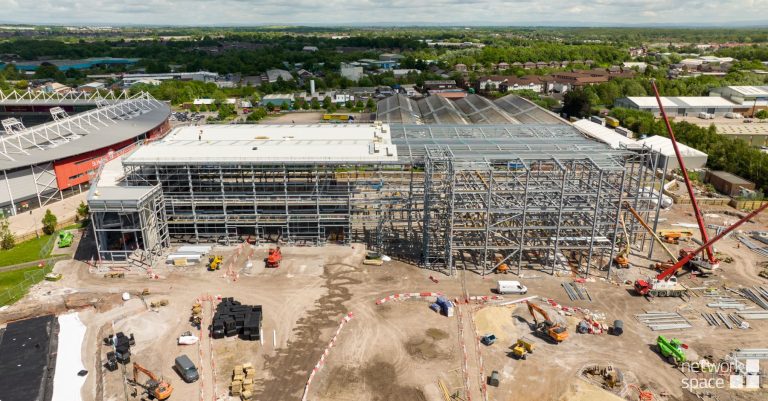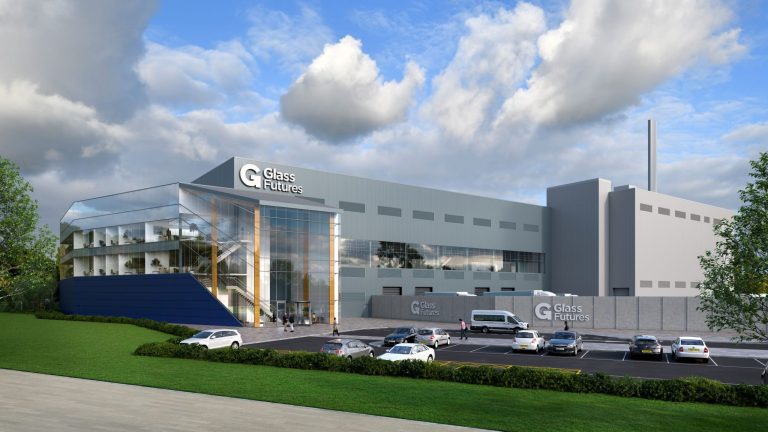Following the announcement of a £15m capital grant from UK Research and Innovation (UKRI) under the Transforming Foundation Industries Challenge to bring globally leading capacity to the Glass Futures’ Centre of Excellence in St Helens, Glass Futures’ Chief Executive Richard Katz, said: “This £15m funding is an essential catalyst to kickstart the delivery of Glass Futures’ £54m Global Centre of Excellence in St Helens, an area rich in glass history. The state-of-the-art R&D facility will enable Glass Futures and its members to work collaboratively to research and develop innovative solutions enhancing resource efficiency, moving the industry closer to sustainable low-carbon glass production and increasing productivity.” “With this grant, UKRI recognises the importance glass has to play in a future to be built on sustainable, fully recyclable, low-carbon products manufactured with highly efficient processes.” The £15m UKRI grant will be used to install a collaboratively designed, globally unique, experimental furnace and state of the art infrastructure capable of producing 30 tonnes of glass per day. This line will enable Glass Futures’ members and researchers to work together with academia to test alternative fuels, new raw materials, Industry 4.0 concepts, demonstrate new products and develop new processes, enabling the Glass Industry to implement change in a safe experimental space. Developments at the facility will also have profound implications for other Industries such as Chemicals, Ceramics, Paper, Steel and Cement. Together with Glass, these industries known as Foundation Industries provide the foundations for civilisation. They share common challenges and require similar developments and, although Glass Futures’ primary focus is the glass sector, it is hoped many of the industry efficiency projects can be directly implemented in other Foundation Industries. Richard added: “The world as a whole needs to move to low carbon and highly efficient processes, but this change does not come without investment, both in time and money. Our Government is supporting the Foundation Industries to enable innovation and help create shared prosperity. No single organisation can enable a global shift in industrial practice, but Glass Futures has begun to show a new path to collaboratively pooling knowledge, resources, and effort. We sincerely thank all our members and supporters who are helping realise an ambitious and game changing facility.” Glass Futures is a not-for-profit membership organisation with a Board comprising leading individuals from the global glass industry, its supply chain and academia. The facility will also enable highly diverse apprenticeships and a unique centre to up-skill workers across the total glass supply chain, tapping into existing and potential talent within the St Helens’ community, across the Northern Powerhouse and internationally. The facility will attract inward investment to the north-west of England as leading players across the glass supply chain and academia begin to use the facility for R&D, training, conferences and even as a new base for parts of their business. Global glass manufacturers, large and small, and their supply chains are invited to join with Glass Futures to be at the forefront of these essential new technologies, promoting collaboration and change. Equally, the sister Foundation Industries are welcome to join and share knowledge. Further Background on Glass Futures: The 158,000 sq. ft facility is being built on a 14-acre site adjacent to St Helens’ Rugby League ‘Totally Wicked’ stadium. The facility will be centred around a 30 tonne per day low carbon demonstration furnace creating the world’s first openly accessible, commercially available, multi-disciplinary glass melting facility with provision for research and development trials to establish new manufacturing techniques, raw materials, improved efficiencies whilst decarbonising the glass industry. The site in St Helens is expected to create around 50 highly skilled jobs directly, along with hundreds of indirect employment opportunities. Earlier in 2020, Glass Futures was awarded a £7.1m contract by the Department for Business, Energy & Industrial Strategy (BEIS) to investigate alternative low carbon energy sources to replace high carbon natural gas in the production of glass. Glass Futures is already lauded as a game changer leading to substantial improvements in manufacturing methodology, enhanced automation and increased efficiencies whilst targeting the removal of CO2 from the manufacturing process, significantly enhancing sustainable growth in the Liverpool City Region.






